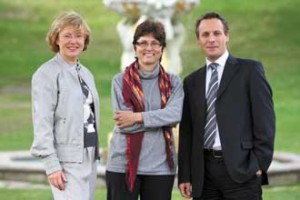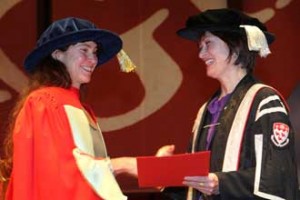
By Neale McDevitt
They are four different teachers who have taken four wildly different paths to get to McGill. One is a Polish-born faculty lecturer of chemistry; another is an MIT-trained linguist who specializes in Malagasy, one of the official languages of Madagascar; another is a professor from the English Department on sabbatical to write a book on Ovid; and the fourth is Chair of the Department of Performance of the Schulich School of Music and a renowned teacher of the viola.
On Nov. 14, those four different paths lead to centre stage at the Fall 2008 Convocation ceremonies as Maggie Kilgour, Grazyna Wilczek, Lisa Travis, and André Roy were fêted as the 2008 recipients of the Principal’s Prize for Excellence in Teaching. Different as their careers may be, the award-winning quartet share similar ideologies when it comes to teaching.
Journey of discovery
“Show up to class and don’t beat anyone,” said Maggie Kilgour with a laugh when asked about her classroom philosophy.

Jokes aside, Kilgour said the key to her success as a professor of Renaissance literature and classical literature in translation is to look at the whole process as a journey she is taking with her students. “Yes, I am paid to know more than the students,” she said. “But it’s an exploration we’re taking together.”
On sabbatical until August 2009, Kilgour said the thing she misses most about teaching is, well, teaching. “It is so important to have a balance. The research I do means I’m at home, alone, brooding in ‘my tower of filthy creation,’ ” she said quoting one of her favorites, Mary Shelley. “So it is good for me to meet other minds.”
Privileged job
Like Kilgour, Grazyna Wilczek is most appreciative of the minds she works with every day in the advanced chemistry lab courses she leads. “It is like the United Nations because the students come from all over the world,” said Wilczek, who moved to Montreal from her native Poland in 1986 to teach at McGill.
“There is such a diversity of ideas and experience,” she continued. “My students are excellent chemists and mathematicians, but they also play in Irish bands, write plays and are gold-medal winning athletes. It really is mind blowing.”
Calling her dual role as teacher and advisor “a privilege,” Wilczek has one word of advice for new professors.
“Teach the students that you have, not those that you would like to have,” she said. “If you believe in your students’ success, you will be not be disappointed.”
Give and take
“People think that teachers have to be good talkers, but you also have to be a good listener,” said Lisa Travis. And, as a professor of syntax in the Linguistics Department, the 25-year McGill veteran is well-placed to discuss the virtues of lending an ear.
“I’m training my grad students to do what I do, but it has to come from them, it has to be their ideas,” she said. “Basically you have to shut up and let what they are come through. You don’t want them to be just another version of you.”
Travis says one of the joys in teaching a relatively young discipline such as linguistics is that teachers and students feed off each other’s enthusiasm. “It is infectious for students to see that even after 25 years, it is still fun and exciting,” Travis said. “ But upper-level syntax courses are often where students are making discoveries because they are more willing to think outside the box than we are. Sometimes you can have a student who just changes your world view.”
Validating music
André Roy says the first thought that crossed his mind upon learning he had won an award was, “How can that be? I haven’t discovered a planet or cured a rare disease.
“Honestly, I felt happier for music than for myself because it proved that music is recognized at McGill.”
A former assistant principal viola with the Montreal Symphony Orchestra, Roy joined McGill full time in 2001.
As with some of his fellow award winners, Roy uses the word “privilege” to describe his job.
“Students come here with huge expectations and unbelievable talent,” he said. “It is a huge responsibility because they put their full trust in you and you can really have a serious impact on their careers.
“But I also feel privileged to be exposed to the way young people envision music for the future. It really keeps you on your toes. Sometimes we professors feel like we’re learning just as much from our students as they learn from us.”
